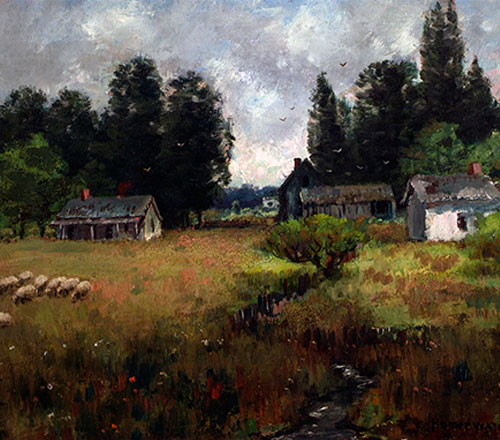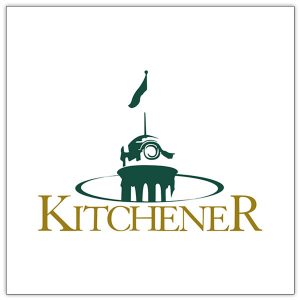Homer Watson's Studio Exhibition
Tour Homer Watson's Original Paint Studio
Come and visit Homer Watson’s original paint studio. On the walls hang original pieces from all eras of his career.
From time to time we will rotates the pieces in this room to highlight different themes of Homer’s work.
Interested in an interpretive tour? Connect with the Gallery at 519.748.4377.
Watson’s Travels

Homer Watson is widely known for his depictions of the Canadian landscape. Although he spent most of his career living and working in the village of Doon, Watson also travelled to the United States, the United Kingdom and across Canada. Watson’s travels allowed him to develop his skills as an artist. For example, Watson credits his ability to accurately depict sheep to his travels to Pittenweem, Scotland. His sheep painting abilities can be viewed in the painting, “Sheep Grazing in a Farmhouse Pasture (1890),” currently on display in the Watson Studio at Homer Watson House & Gallery. Watson’s frequent trips to the United Kingdom helped solidify his place in the international art world and allowed him to meet other artists, writers and politicians such as James Abbitt McNeil Whistler, Oscar Wilde and future Prime Minister of Great Britain, Winston Churchill. The events that lead to Watson’s personal meeting with Churchill would be memorable to say the least.
Homer Watson visited the United Kingdom for the last time in 1912. He travelled to London for the opening of an art exhibition at the Goupil Gallery where four of his paintings were exhibited along with the works of his good friend and artist Edward Archibald Browne. Following the opening of the exhibition, a celebratory dinner was held at the Chelsea Club, a fashionable London club frequented by artists at that time. Watson attended the dinner along with Browne, American-born London artist John Singer Sargent, and British artist and cartoonist Leonard Raven-Hill. Under the influence of a round of champagne, the conversation turned from art to politics. A British participant suggested that countries within the British Empire relied too heavily on the British Navy for defence and protection. He continued, stating that these countries (including Canada) should be building dreadnoughts and supplying them to Britain. Watson and Browne disagreed, and a heated argument ensued. As the debate reached its climax, Watson proclaimed that he would build several dreadnaughts himself and give them as a personal gift to the British Navy. Riled up by this argument and likely still under the influence of the champagne, Watson travelled back to his hotel and promptly wrote a letter to the Admiralty in which he criticized the entire British Navy.
Biographers Muriel Miller and Gerald Noonan later wrote of the incident in their works on Homer Watson, though neither were able to determine whether this letter was ever mailed. Regardless, it is clear that the Admiral for the British Navy found out about the remarks made by Watson. A few days following the now infamous Chelsea Club dinner Watson was summoned to a meeting with the First Lord of the Admiralty, Winston Churchill. Luckily for Watson, the two had previously met at a dinner party in Toronto, at the home of Politician, businessman, and a founder and benefactor of the Royal Ontario Museum, Sir Edmund Olsler. Watson was able to diffuse Churchill’s legendary temper by admitting his remarks were more a result of his alcohol consumption, not his personal views and he retracted his comments. The situation was aided by the fact that the two men shared a common interest in art and painting; Churchill was an amateur painter throughout his life, and the two men left on good terms. Watson returned to Canada knowing this incident had been resolved. Winston Churchill would go on to become one of the most important Prime Ministers in British History playing a crucial role during the Second World War in leading the Allies to victory.
-Nichole Martin, Curatorial & Collections Assistant, Homer Watson House & Gallery
Nichole Martin, Curatorial and Collections Assistant








